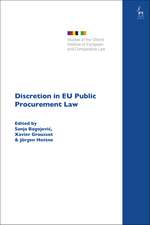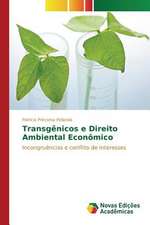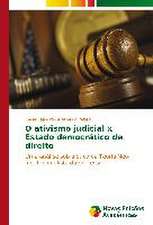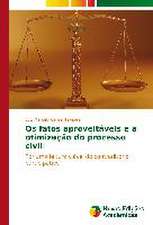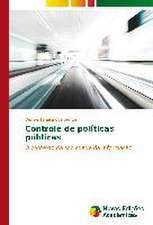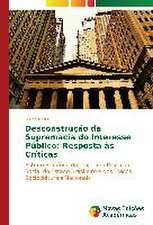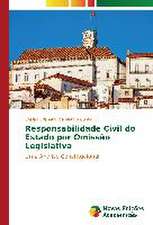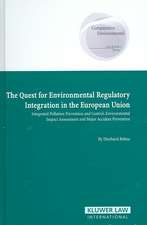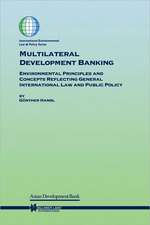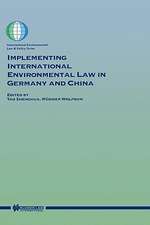Emissions Trading Schemes: Markets, States and Law
Autor Sanja Bogojevicen Limba Engleză Hardback – 3 iul 2013
Preț: 539.57 lei
Preț vechi: 773.54 lei
-30% Nou
Puncte Express: 809
Preț estimativ în valută:
103.25€ • 108.07$ • 85.93£
103.25€ • 108.07$ • 85.93£
Carte disponibilă
Livrare economică 10-24 martie
Preluare comenzi: 021 569.72.76
Specificații
ISBN-13: 9781849464055
ISBN-10: 1849464057
Pagini: 228
Dimensiuni: 156 x 234 x 18 mm
Greutate: 0.5 kg
Ediția:New.
Editura: Bloomsbury Publishing
Colecția Hart Publishing
Locul publicării:London, United Kingdom
ISBN-10: 1849464057
Pagini: 228
Dimensiuni: 156 x 234 x 18 mm
Greutate: 0.5 kg
Ediția:New.
Editura: Bloomsbury Publishing
Colecția Hart Publishing
Locul publicării:London, United Kingdom
Caracteristici
This book looks at emissions trading schemes from a new perspective by examining the assumptions about emissions trading, as featured in emissions trading scholarship and in debates involving law and policymakers and the judiciary at the EU level.The book makes a strong argument for reconfiguring the common understanding of emissions trading schemes as regulatory strategies, and sets out a framework for analysis to sustain that reconfiguration. A unique book which will be of interest to Environmental and International Trade lawyers who are concerned with emissions trading schemes.
Notă biografică
Sanja Bogojevic is a Lecturer in Law at Lund University, Sweden
Cuprins
1. From Uniformity to Legal Particularities of Governance Regimes: Revising the Framework of Analysis for Emissions Trading Schemes in Law I. Introduction II. Emissions Trading Schemes and their High Profile in Environmental Law III. The Importance of Methodology 2. Deconstructing Emissions Trading Discourses I. Introduction II. Defining Basic Concepts III. The Three Models IV. Evaluating and Comparing the Models V. Applicability of the Models VI. Conclusion 3. The EU Emissions Trading Scheme and the Importance of Legal Culture I. Introduction II. EU Emissions Trading Scheme III. EU Legal Culture: Intersections between Markets, the Judiciary and Law IV. All Together Now: International Climate Change Law, the Internal Market, EU Courts, EU Environmental Law and the EU ETS V. Conclusion 4. Unpacking EU Emissions Trading Discourses (I): The Commission I. Introduction II. The Institutional Identity of the Commission and its Treatment of Emissions Trading as a Regulatory Concept III. Mapping Models onto the Commission's EU ETS-Related Discourses IV. Reflections V. Conclusion 5. Unpacking EU Emissions Trading Discourses (II): EU Courts I. Introduction II. EU ETS Jurisprudence and the EU Courts III. Mapping Models onto EU ETS-Related Judicial Discourses IV. Reflections V. Looking Ahead VI. Conclusion 6. The 'Honeymoon' in Environmental Law Scholarship I. Introduction II. Defining the 'Honeymoon' in Environmental Law Scholarship III. Why the Honeymoon in Environmental Law Scholarship Exists IV. Reflections: Long Honeymoon, Sweet Ending? V. Conclusion 7. Conclusions I. Beyond Uniformity of Emissions Trading Schemes II. Summary of Analysis III. The End of the Honeymoon? IV. Looking Ahead V. Conclusion
Recenzii
...a most convincing contribution to the field of climate and environmental law. The discourse theory-based conceptual framework it proposes to analyse emissions trading offers a much needed new perspective to the discipline. This contribution to the conceptualisation of emissions trading is not only useful for academics and students of climate law, but also for practitioners including policy-and law-makers.
The relative brevity of this well-written book belies the impressive intellectual feat it contains...Bogojevic discusses a very dense and technically complex body of jurisprudence [with] refinement and clarity...it is to be hoped that law scholars in other fields will follow Dr Bogojevic's example and more attention will be paid to the implicit, and typically unquestioned, assumptions that often underlie legal scholarship.
Ultimately this book seems to represent a warning (seen in other contexts but here the colours are nailed to the mast of emissions trading discourse) against importing reductionist techniques into this notably complex area of law and policy...Indeed, as environmental lawyers, and especially in light of the EU experience thus far of emissions trading, we may usefully see this as a call to us to clamber out of our self-built disciplinarysilos and to engage more effectively in matching regulatory rationales to regulatory utputs.
The relative brevity of this well-written book belies the impressive intellectual feat it contains...Bogojevic discusses a very dense and technically complex body of jurisprudence [with] refinement and clarity...it is to be hoped that law scholars in other fields will follow Dr Bogojevic's example and more attention will be paid to the implicit, and typically unquestioned, assumptions that often underlie legal scholarship.
Ultimately this book seems to represent a warning (seen in other contexts but here the colours are nailed to the mast of emissions trading discourse) against importing reductionist techniques into this notably complex area of law and policy...Indeed, as environmental lawyers, and especially in light of the EU experience thus far of emissions trading, we may usefully see this as a call to us to clamber out of our self-built disciplinarysilos and to engage more effectively in matching regulatory rationales to regulatory utputs.
Descriere
This book makes a strong argument for reconfiguring the common understanding of emissions trading schemes as regulatory strategies, and sets out a framework for analysis to sustain that reconfiguration.



